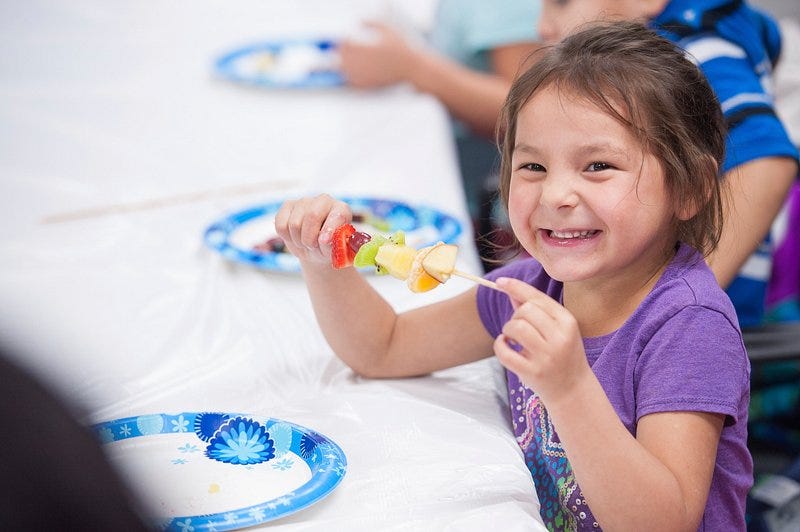Introduction
Good nutrition is the foundation of a child’s growth, development, and long-term health. However, getting kids to eat healthy can be a challenge for many parents. From picky eaters to junk food cravings, establishing healthy food habits early is crucial.
This guide covers practical tips, balanced meal ideas, and strategies to help children develop lifelong healthy eating habits.

Why Healthy Eating Matters for Kids
Proper nutrition in childhood:
- Supports physical growth and brain development
- Strengthens the immune system
- Improves concentration and academic performance
- Reduces risks of obesity, diabetes, and other health issues later in life
Since kids mimic their parents’ habits, setting a good example is key.
Essential Food Groups for Kids
A balanced diet for children should include:
1. Fruits & Vegetables
- Provide vitamins, minerals, and fiber
- Encourage variety (different colors = different nutrients)
- Tip: Sneak veggies into smoothies, sauces, or baked goods
2. Whole Grains
- Brown rice, whole wheat bread, oats, quinoa
- Better than refined grains (white bread, sugary cereals)
- Helps maintain steady energy levels
3. Protein-Rich Foods
- Lean meats, eggs, beans, lentils, tofu, nuts (if no allergies)
- Essential for muscle growth and repair
4. Dairy (or Dairy Alternatives)
- Milk, yogurt, cheese (or fortified plant-based options)
- Important for bone health (calcium & vitamin D)
5. Healthy Fats
- Avocados, nuts, seeds, olive oil, fatty fish (salmon, tuna)
- Supports brain development
How to Encourage Healthy Eating Habits
1. Be a Role Model
- Kids copy parents—eat veggies, drink water, and avoid junk food in front of them.
2. Make Meals Fun & Interactive
- Let kids help with cooking (washing veggies, stirring batter).
- Use creative presentations (fruit skewers, veggie faces on pizza).
3. Set a Routine
- Regular meal & snack times prevent excessive hunger and overeating.
- Avoid letting kids graze all day—structure helps digestion.
4. Limit Sugary Drinks & Processed Snacks
- Replace soda with water, milk, or homemade smoothies.
- Swap chips with air-popped popcorn, nuts, or yogurt.
5. Don’t Force Food, But Keep Offering
- It can take 10+ tries before a child accepts a new food.
- Avoid pressuring—encourage tasting without forcing.
6. Avoid Using Food as a Reward
- Instead of candy for good behavior, try stickers, extra playtime, or a fun activity.
Healthy Meal Ideas for Kids
Breakfast:
- Oatmeal with berries & nuts
- Scrambled eggs with whole wheat toast
- Greek yogurt with honey & granola
Lunch:
- Whole wheat wrap with turkey, cheese, and veggies
- Quinoa salad with chickpeas & cucumbers
- Homemade chicken nuggets with sweet potato fries
Dinner:
- Baked salmon with mashed potatoes & steamed broccoli
- Stir-fried tofu with brown rice & mixed veggies
- Lentil soup with whole grain bread
Snacks:
- Apple slices with peanut butter
- Cheese cubes & whole-grain crackers
- Carrot sticks with hummus
Dealing with Picky Eaters
Many kids go through phases of picky eating. Here’s how to handle it:
1. Offer Choices (But Within Limits)
- Instead of “What do you want to eat?” ask “Do you want carrots or cucumbers?”
2. Mix Familiar & New Foods
- Pair a disliked food with a favorite (e.g., broccoli with mac & cheese).
3. Stay Patient & Positive
- Avoid power struggles—mealtime should be stress-free.
4. Sneak in Nutrients
- Blend spinach into smoothies, add grated zucchini to muffins.
Foods to Limit (Not Necessarily Ban)
- Sugary cereals & candies → Cause energy crashes
- Fried foods (chips, fries) → High in unhealthy fats
- Processed meats (hot dogs, nuggets) → Often high in sodium & preservatives
Moderation is key—occasional treats are fine!
Final Tips for Long-Term Success
- Involve kids in grocery shopping & meal prep.
- Keep healthy snacks visible (fruit bowl on the table).
- Educate them on why good food matters (in a fun way).
Conclusion
Healthy eating habits start at home. By offering nutritious foods, setting a good example, and making meals enjoyable, parents can help kids develop a positive relationship with food that lasts a lifetime.
Small changes today lead to big health benefits tomorrow!